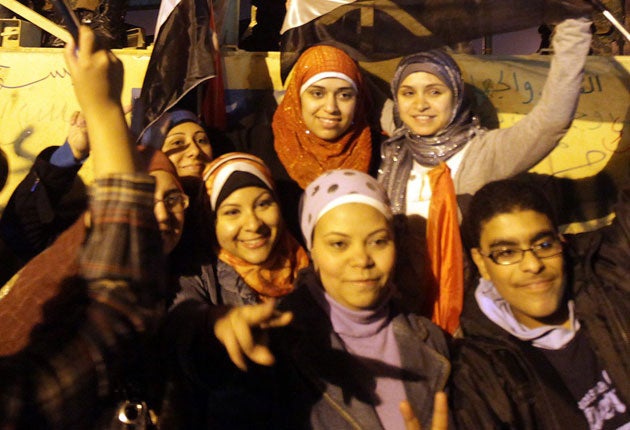Egyptian military calls for 'damaging' strikes and protests to end

The Egyptian military yesterday reinforced its efforts to try to return the country to normal by demanding an end to strikes and protests while holding out the prospect of an accelerated agenda on political reform.
There were indications from the military and Prime Minister Ahmed Shafik that liberalising amendments to the constitution would be drafted in time to put them to a national referendum in two months, while the civilian cabinet would be reshuffled to bring in opposition politicians.
But the ruling Higher Military Council issued a stern warning on state television that demonstrations and a wave of labour unrest over pay and conditions were damaging security and the economy, adding: "Noble Egyptians see that these strikes, at this delicate time, lead to negative results."
The prospect of an early referendum first surfaced in accounts of a meeting on Sunday night between two top generals and the young activists who organised the more than two weeks of protests that brought down former president Hosni Mubarak on Friday.
The activists – including Wael Ghonim, the Google marketing executive who was jailed for 12 days under the Mubarak regime for his part in the protests – said that the generals had indicated that constitutional amendments would be drafted within 10 days and put to a referendum in two months, preparing for civilian rule. Mr Ghonim and another protest organiser, Amr Salama, were two of the seven activists who took part in the meeting with the generals and they emphasised they were speaking for themselves.
But they said in a Facebook posting: "We all sensed a sincere desire to preserve the gains of the revolution and unprecedented respect for the right of young people to express their views."
Meanwhile, the British Foreign Secretary, William Hague, said Mr Shafik had told him he would reshuffle his cabinet in the coming week to bring opposition figures into the line-up, which had been appointed by Mr Mubarak in an effort to prolong his rule.
But the military adopted a significantly more authoritarian tone in its communiqué yesterday, the fifth since it convened in continuous session on Mr Mubarak's last full day in office.
It wants to swiftly quell the strikes and workers' demonstrations that have spread in the aftermath of the 25 January protests. These have involved the private and state-owned manufacturing industries, ambulance drivers, journalists, transport workers and the police, several hundred of whom demonstrated yesterday in downtown Cairo hoping for better conditions and more sympathy from the public.
Meanwhile, reports started to surface in the Egyptian press of a noisy confrontation between Mr Mubarak's two sons during the recording of their father's last defiant speech the night before he left office. Though unconfirmed, the reports suggested that it had been Gamal Mubarak – who had been seen as a potential successor to his father before the crisis – who persuaded him to ignore pressure from the military to go last Thursday.
According to the report in the government-owned Al Akhbar newspaper, Gamal Mubarak was among those in his father's circle who urged him to ignore military demands that he announce in a speech that he would go on Thursday.
The paper said that an argument – so loud it could be heard throughout the presidential palace and nearly ended in a fight – then ensued between Gamal Mubarak and Alaa Mubarak, with the latter telling his brother that he had dragged the country into corruption and adding: "Instead of working to help your father be honoured at the end of his life, you helped damage his image this way."
The significance of the report – if true – is that it suggests the United States knew of the original speech the military was insisting on but not that Gamal Mubarak had dissuaded his father from making it. That would help to explain Barack Obama's upbeat praise for the protests shortly before Mr Mubarak temporarily dashed Washington's hopes that he was on his way out.
Mubarak 'in poor health'
Ex-President Hosni Mubarak's health is reported to have deteriorated since he fled Cairo for the coastal resort of Sharm el Sheikh. Mubarak has been said before to have been treated for cancer, though he has always denied this.
Locals in the resort town said police guards had told them Mubarak was bedbound and unable to walk unassisted.
Sameh Shoukry, Egypt's ambassador to Washington, said he had been informed that Mubarak's health had taken a turn for the worse. "I am following the rumours and the press reports related to his health, and might have received some communication at a personal level indicating that he is possibly in somewhat of bad health," he said.
Subscribe to Independent Premium to bookmark this article
Want to bookmark your favourite articles and stories to read or reference later? Start your Independent Premium subscription today.

Join our commenting forum
Join thought-provoking conversations, follow other Independent readers and see their replies